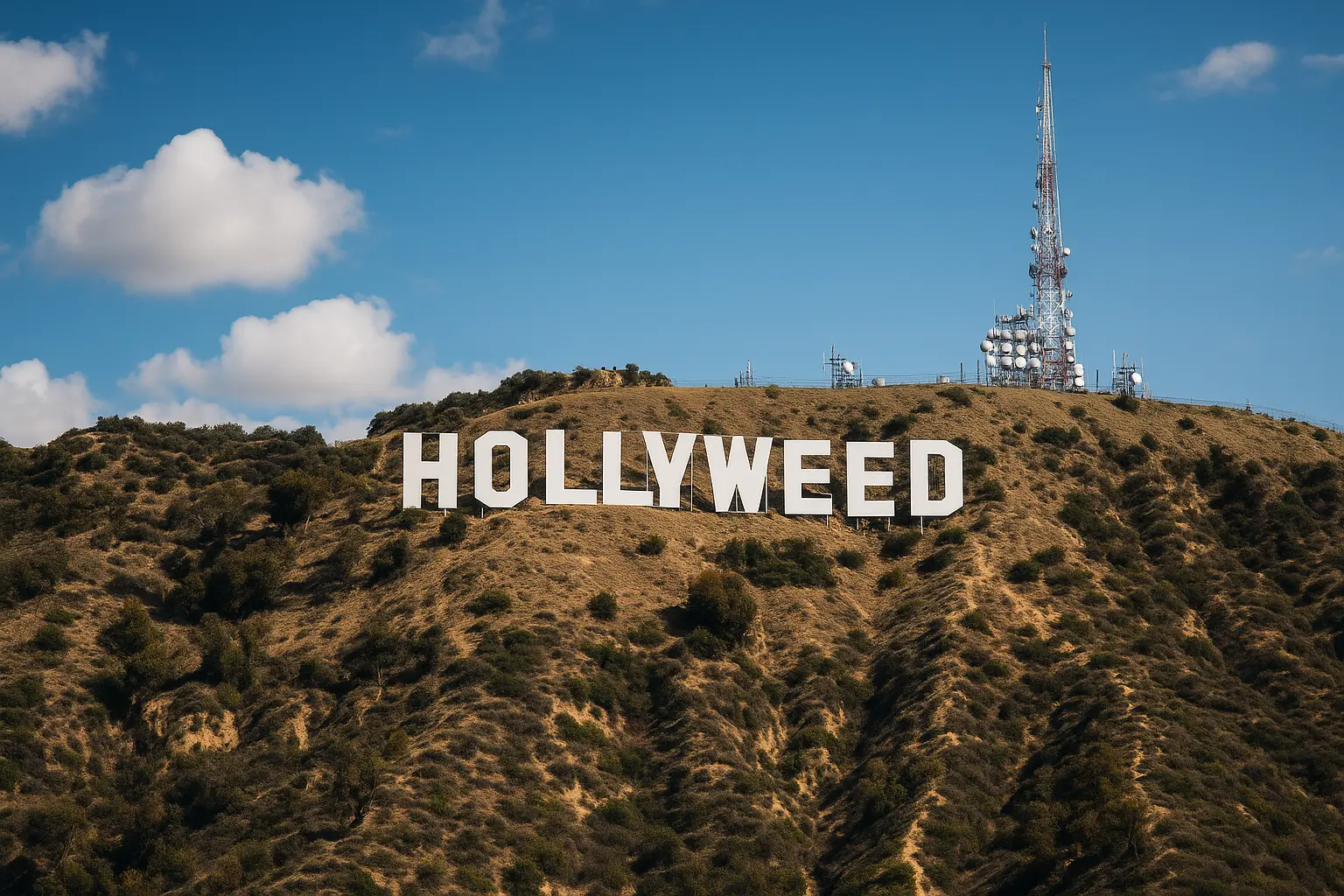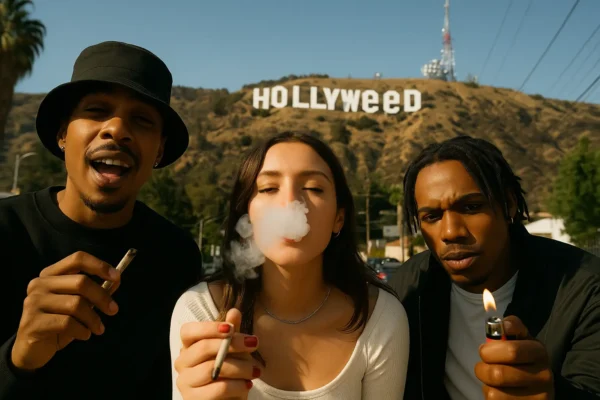Have a question? 06 70 73 89 02
🔞 Not for sale to under 18s
⏱️ 48-HOUR FLASH SALE: 20% off EVERYTHING on the site with the code FLASH 💥 ( excluding accessories and gummies)
Have a question? 06 70 73 89 02

Like many of us, you may have been searching for something like "cheap CBD" or "herbal tea" and come across the Google suggestion "Hollyweed" alongside your query. And like us, you may have wondered: "What the hell is Hollyweed?"
Then you discovered a store you'd never heard of before. And if you, too, kept asking yourself "where does this come from? why did Google suggest it to me? is it really that famous? Then you're going to want to know more.
After all, we investigated this brand and its associated suggestion, and here are the results of our research!
The term Hollyweed is far from new. It first appeared on a large scale on January 1, 1976, in the heart of California. On that day, art student Danny Finegood decided to modify the famous Hollywood sign perched in the hills above Los Angeles. By changing the two letters "O" to "E", he transformed the icon of American cinema into a huge "HOLLYWEED" visible for several hours.
More than just a play on words, the act had artistic and political significance: Finegood wanted to celebrate the entry into force of a new Californian law that relaxed penalties for marijuana possession from a serious offense to a simple misdemeanor.
This militant joke, which has become mythical, was reissued in 2017 by artist Zach "Jesushands" Fernandez at a time when California had just legalized the recreational use of cannabis.
While California is often considered the cradle of "Cali weed" culture, it was not the first to take the step to full legalization. The state did pave the way for the medical use of cannabis back in 1996, but recreational legalization came six years after Colorado (2012), the first American state to legalize, immediately followed by Washington.
In the same year that HOLLYWEED was re-released on the hills of California, in 2017, the term crossed the Atlantic and made its debut in France thanks to an eponymous comedy series broadcast on OCS.
Far from California's beaches, the story takes place in a French village, nestled on a small fictional island, isolated and plagued by unemployment. The fate of its inhabitants changes the day 25 tons of cannabis resin wash up on the beach.
Faced with this unexpected windfall, the villagers, both clueless and opportunistic, decide to start exploiting this resource that is as illegal as it is lucrative. Part social satire, part moral farce, Hollyweed ironically depicts the contradictions of rural France's quest for economic survival.
Despite an original idea and a quirky tone, the series met with moderate success, and lasted onlyone season.
For a long time a mere cultural wink, the word Hollyweed resurfaces in 2022 in a much more commercial form. This time, it's not an artistic act or a TV series, but a major marketing campaign by a Californian brand of legal cannabis.
Relying on polished communications and meticulous storytelling, the Hollyweed brand is pulling out all the stops: ubiquitous social networks, massive influencer campaigns, premium goodies, and a luxurious visual identity worthy of the greatest lifestyle brands. This large-scale operation has propelled the brand to the forefront of the American legal cannabis scene.
In the wake of this success, a marketing opportunity has opened up in France. An online boutique bearing the same name has been launched, but it appears to be separate from the Californian store.
There are certain similarities in terms of product range and packaging, but it only seems to be linked to the American brand in name. Rather, it's a clever way of capitalizing on Hollyweed's international aura.
More than just a brand of CBD products, California-based Hollyweed seems intent on making its mark with its storytelling.
On its official website, it features Zach "Jesushands" Fernandez, seeking to build an identity that is both rebellious and artistic. In their own words:
"Today, Hollyweed is a lifestyle brand; a movement that fuses design, cannabis and culture into products and experiences that create connections and challenge norms."
Hollyweed has positioned itself as a true lifestyle brand, offering not only legal cannabis, but also clothing, accessories and various goodies.

Hollyweed's visual universe is directly inspired by the American "post-streetwear" codes popularized by Yeezy (Kanye West), Fear of God and the campaigns of Travis Scott and Playboi Carti. Androgynous silhouettes, oversized cuts, monochrome hues, minimalist white backgrounds: it's all there. The result is an urban, distanced, almost spiritual aesthetic that plays with the codes of luxury and detachment.
In addition to its street storytelling and cultural codes, Hollyweed boasts polished branding and a masterful visual identity. Hollyweed's pre-rolls, flowers and vapes are presented in sober, luxurious packaging, in plain, elegant colors.
Each molecule and product type is distinguished by a precise color code, while the perfectly legible sans-serif typography reinforces the impression of minimalist, premium design.
The brand doesn't just sell products: it sells a lifestyle. As the brand itself claims, Hollyweed embodies a lifestyle more than a simple consumer experience. But this style is a radical departure from the imaginary world of the streets, gangs and trafficking. Here, cannabis culture becomes clean, chic and soothing, translated into a brand language inspired by Californian luxury.
Like many American brands, Hollyweed flowers, vapes and pre-rolls are positioned as objects of distinction: symbols of a certain refinement, but also of trendiness.
In France, CBD is not perceived as a luxury product. The market is much less based on a streetwise, cool and trendy aesthetic, and is instead divided into two more or less distinct trends.
The first group includes consumers looking for a legal, healthier alternative to traditional cannabis.
There are many of them: France remains one of the most cannabis-consuming countries in Europe, despite some of the most repressive legislation. These users are primarily looking for the most potent CBD flowers, resins or derived molecules (H4CBD, THCP, etc.), close to the cannabis experience without breaking the law.
The second, even more massive trend concerns wellness consumers: those looking for a gentle, natural, non-medicated solution to improve their quality of life. In fact, the market for wellness and dietary supplements in France is now worth almost 2.9 billion euros (2024), up more than +3% on the previous year.
Following the successful marketing coup pulled off by American brand Hollyweed, the term "Hollyweed CBD pas cher" has established itself as an SEO mainstay in the CBD world. On search engines, it now ranks second, just behind the keyword "CBD".
Some see it as the sign of a hybrid trend: the search for an iconic CBD, inspired by the Californian aesthetic of cool, trendy "Cali weed", combined with a desire for affordable products. In short, a marketing trend that would appeal to demanding young consumers, looking for a stylish, quality product at a reasonable price.
Yet this popularity seems deceptive. The keyword "Hollyweed CBD pas cher" doesn't seem to be used anywhere else: not on social networks, not on forums, not in consumer conversations. Only SEO tools , search engines and specialized SEO sites seem to give it importance.
All this leads us to believe that this is not so much a real trend, but rather an algorithmic bubble: an association of recognizable keywords created by the predictive algorithms that propose it, and artificially generate traffic simply by proposing it. In short, an illusion of popularity created by search engines, rather than by the interests of consumers themselves.
BehindHollyweed's rebellious, Californian image lies less a revolution than a reflection of modern marketing codes.
The brand embodies a lifestyle vision of CBD: clean, designer and socially acceptable, a chic version of a once subversive product. But its SEO success, more than commercial, shows that it is above all an algorithmic symbol: a trend created by search engines more than by consumers.
In France, CBD is part of a different logic: that of daily well-being, natural relaxation, sleep and stress management. More than a fad, it's a cultural evolution, a return to simple, safe and accessible products.
This is precisely the approach we take at CBDOO : to offer quality CBD flowers, oils and herbal teas, designed for real use, far from fads, but close to everyday needs and well-being.